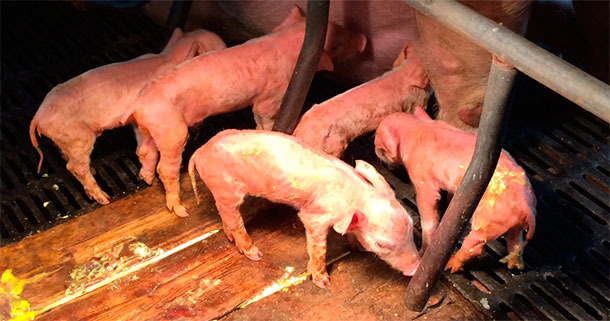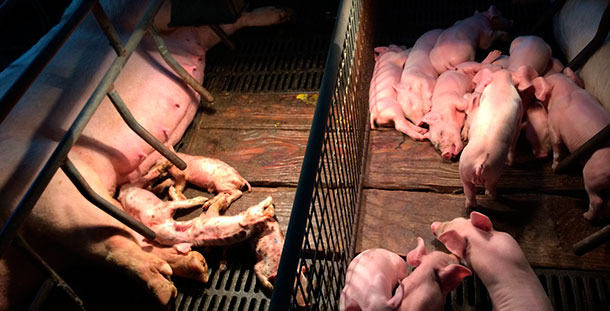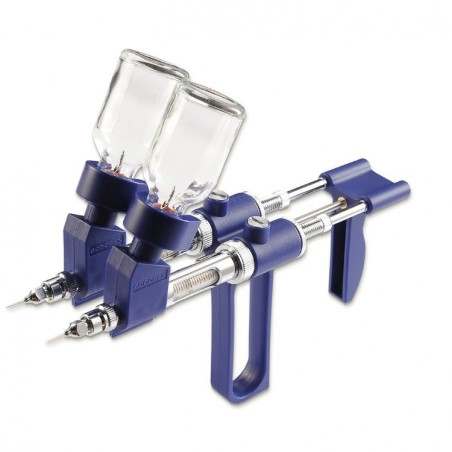PED on the front foot
Porcine epidemic diarrhoea (PED) has thrust itself onto the global pig industry in the last 5 years and is now considered as among the top five health and management threats to the viability of pig farming enterprises. PED is caused by an enveloped, single-strand RNA virus, in the Coronavirus family. Like most ssRNA viruses, it has the propensity to undergo frequent mutations. This has seen the emergence of a series of PED outbreaks involving novel strains of PED.

The current situation can be traced to PED outbreaks that emerged in Korea in 1992. Outbreaks that were related to these Korean strains subsequently appeared across East Asia over the next decade. For example, serious PED outbreaks commenced in the Philippines in 2004, following the importation of young breeder pigs from Korea. These pigs had been imported without checks on their PED status being performed.
A further group of novel PED strains appeared in the People’s Republic of China in 2008, leading to sustained and severe outbreaks across China. These outbreaks later spread via contiguous land borders to the large pig industries of Vietnam and Thailand. Nucleic acid sequencing indicates that there are basically two groups of these current Chinese strains, generally described as the “northern” and “southern” Chinese strains. In 2013, the northern Chinese strain was involved in the commencement of the major outbreaks of PED in the United States of America. This unintended transfer of a major pig pathogen from one continent to another, caused strong concern due to the lack of a clearly evident transfer method, such as the movement of pigs.
The current situation for PED is that of continual occurrence of moderate to severe outbreaks in many pig farms, across Asia, USA and elsewhere, on both naïve farms and those that have suffered previous episodes.
Typical current PED episode
A well-managed 180 sow breeder unit in southern China vaccinated the sows with a range of breeder vaccines, including two doses of a commercial vaccine containing a modified live PED virus derived from a Korean strain. In March 2015, the farm experienced an outbreak of explosive diarrhoea among the new-born piglets in litters from several recently farrowed sows, see Figure 1. The affected litters were scattered amongst other normal farrowings in the farrowing house, see Figure 2. PED virus was confirmed by PCR analysis of intestinal materials.

Figure 1. Severe watery yellow diarrhoea and dehydration in PED affected piglets.

Figure 2. Severe diarrhoea and dehydration in PED affected piglets (left), compared to normal adjacent litter.
The farmer then instituted strong disinfection practices around the breeding pig areas and the collection of intestinal material and contents from affected piglets. He used this fresh material to prepare a “feedback” autogenous live virus material diluted in milk and antibiotics to orally dose all the breeding pigs in the remainder of the farm. Over a 2-week outbreak period, litters from 10 percent of the breeding sows were affected, then the subsequent litters all appeared normal.

Current PED outbreaks tend to recur on previously affected farms
The current experience of many pig farms in Asia and elsewhere is that following the initial and typical PED outbreak that recurrences are common. This recurrence episode of “endemic” PED generally occurs anywhere from 4 to 12 months later, presumably as immunity to PED wanes in the breeding herd.
The reason for this particular feature of current outbreaks of PED strain is not certain. It is possible that the novel Chinese strains have some form of enhanced pathogenicity or transmission ability, derived from mutational changes. Experimental inoculation studies of naïve neonatal piglets involving oral challenge with these novel PED strains has shown a strong virulence with epithelial infection and stunted villi pathogenicity. Field evidence also suggests that many farms experiencing recurrent PED outbreaks have concurrent infection with pathogenic and immune-suppressive PRRS and/or CSF strains, which may act to restrict the pig’s ability to develop full immunity to PED. Recent surveys of East Asian pig farms indicate that more than one third of them have active infections with both PRRS and CSF virus, acting at the same time.
Pig industry responses
Considerable research effort has gone into developing useful information on current PED strains. In terms of piglet infections, faecal shedding peaks at 6 days p.i., but with some pigs (10 %) still shedding at 28 days p.i. The environmental survival of current strains in faeces and water is around 7 days, but with survival in feeds, fomites and slurry from 14 to 28 days. Besides recurrent outbreaks on endemic farms, local transmission between farms in any region remains largely due to the arrival of contaminated trucks, boars, equipment and pigs from infected farms.
The most useful form of control during an outbreak remains the collection and use of feedback of intestinal materials containing fresh PED virus to breeding pigs, particularly pregnant sows. The aim of this procedure is rapid exposure of the whole herd to PED and quick onset of immunity with raised and specific maternal antibody levels.
There has also been great interest in further commercial PED vaccine development, with various available products originating from different countries. These vaccines are usually delivered by injection in late pregnancy. The general aim is also to raise maternal antibody levels to PED virus to levels compatible with prevention of infection in new-born suckling piglets in the face of challenge exposure to PED.
Modified live attenuated vaccine strains were developed from cell culture-adapted Korean strains associated with the previous outbreaks, by both Korean and Japanese vaccine companies. Other vaccines, both killed and modified live vaccine types have now been developed based on the novel Chinese strains, by Chinese and American vaccine companies.
As indicated by the case study, the general experience of farmers using many of the currently available commercial PED vaccines is that usage has rarely been clearly beneficial, with many breakthrough cases of PED in vaccinated pigs. This general failure of current PED vaccine efficacy may be due to a number of reasons, such as differences between vaccinal and field strains, interference in development of protective PED immunity by immune-suppressive PRRS or CSF activity, or structural instability in the PED coronavirus and its relationship to protective cell mediated immunity.
Any pig farm group contemplating vaccine usage must therefore establish that the vaccine antigen product is effective against the widespread Korean and novel strains. Vaccine companies offering commercial PED vaccines need to be capable of demonstrating clear field and experimental data comparing the outcome of PED challenge exposure in piglets from vaccinated or non-vaccinated sows. Hopefully, the piglets derived from vaccinated sows have less chance of developing diarrhoea!




